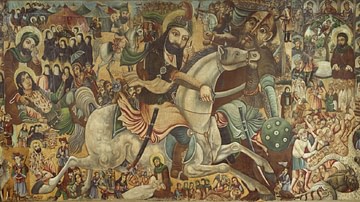Search
Search Results

Definition
Umayyad Dynasty
The Umayyad Dynasty (661-750 CE), the first dynasty to take the title of Caliphate, was established in 661 CE by Muawiya (l. c. 602-680 CE), who had served as the governor of Syria under the Rashidun Caliphate, after the death of the fourth...

Definition
Seventh Crusade
The Seventh Crusade (1248-1254 CE) was led by the French king Louis IX (r. 1226-1270 CE) who intended to conquer Egypt and take over Jerusalem, both then controlled by the Muslim Ayyubid Dynasty. Despite the initial success of capturing Damietta...

Article
Battle of Karbala
The Battle of Karbala (10 October 680 CE) was a small-scaled military engagement, fought near the river Euphrates, in modern-day Iraq, which saw the massacre of heavily outnumbered Alid troops under the command of Husayn ibn Ali (l. 626-680...

Definition
Saladin
Saladin (1137-93) was the Muslim Sultan of Egypt and Syria (r. 1174-1193) who shocked the western world by defeating an army of the Christian Crusader states at the Battle of Hattin and then capturing Jerusalem in 1187. Saladin all but destroyed...

Definition
Crusader States
The Crusader States (aka the Latin East or Outremer) were created after the First Crusade (1095-1102) in order to keep hold of the territorial gains made by Christian armies in the Middle East. The four small states were the Kingdom of Jerusalem...

Definition
Kingdom of Jerusalem
The Kingdom of Jerusalem was a state created in 1099 CE by Crusaders and western settlers after the First Crusade (1095-1102 CE). With Jerusalem as its capital, the kingdom was the most important of the four Crusader States in the Middle...

Definition
Acts of the Apostles
The Acts of the Apostles is the story of how the movement that became Christianity began in Jerusalem and spread throughout the Eastern Mediterranean cities of the Roman Empire. It was written by the same author as the third gospel, assigned...

Article
Interview: Medieval Christian Art in the Levant
Medievalists retain misconceptions and myths about Oriental Christians. Indeed, the fact that the Middle East is the birthplace of Christianity is an afterthought for many. During the Middle Ages, Christians from different creeds and confessions...

Article
Zengids & the Crusaders: Race for Egypt (1163-1169 CE)
In the aftermath of the failure of the Second Crusade (1147-1149 CE), which only managed to bring Damascus under Nur ad-Din's (sometimes also given as Nur al-Din, l. 1118-1174 CE) dominion, Egypt acquired top priority – both from a strategic...

Definition
Ancient Syria
Syria is a country located in the Middle East on the shore of the Mediterranean Sea and bordered, from the north down to the west, by Turkey, Iraq, Jordan, Israel, and Lebanon. It is one of the oldest inhabited regions in the world with archaeological...